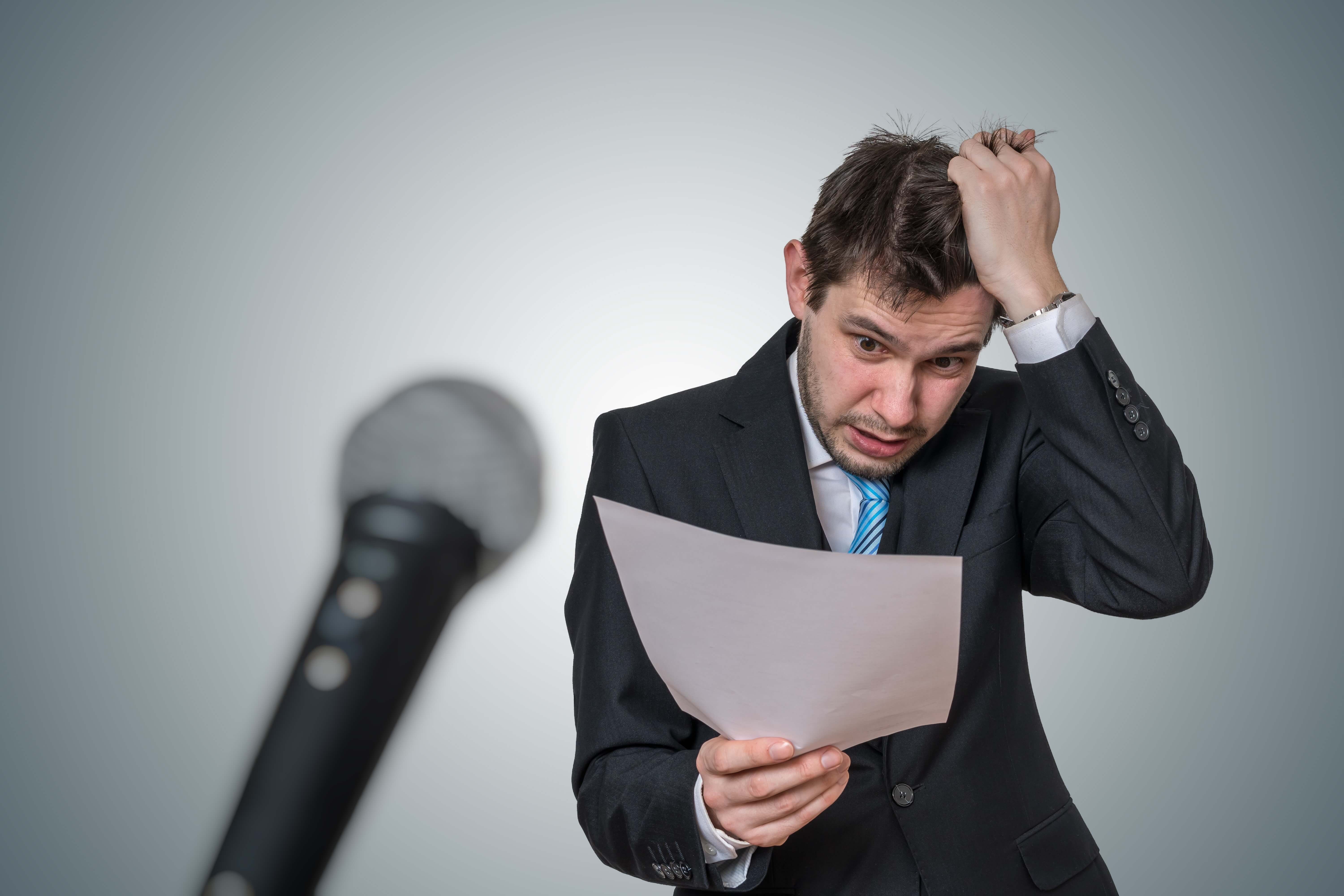Tips for Reducing Anxiety When Speaking
Fear is real and it’s the main reason for most of the calls we get here at MillsWyck Communications. The callers are from all walks of life, all levels of experience, different cultures, have ranged from age 7 to over 70, and speak all languages. The problem is the same. “I get anxious (scared, frightened, freeze up, nervous, tense) when I have to speak. Can you help me become a more confident speaker?”
Searching Amazon for a book on the “fear of public speaking” turns up over 300 titles that promise to cure you of this dreadful affliction (Note to self: since I don’t think you can overcome fear, I haven’t written that in my blurb, so my book, Presentation Sin, is noticeably absent from the list). Virtually all humans share some level of dread when they have to speak in front of their fellow man.
Jerry Seinfeld has given ammunition to people to justify their fear: “According to most studies, people’s number one fear is public speaking. Number two is death. Death is number two. Does that sound right? This means to the average person, if you go to a funeral, you’re better off in the casket than doing the eulogy.”
But I have a different view, possibly in part because I still get nervous when I speak (I have over 12,000 hours of speaking experience and have been doing it full-time for close to three decades). If I can’t get over my fear, then maybe it’s not going away! Just last month, I heard a lecture from a psychologist who says that nervousness comes from the same part of the brain that excitement originates from. It’s a sign that what you’re doing is important. Your speaking matters. And, not surprisingly, that causes anxiety.
Here are two examples from common life that educate us in our pursuit of eliminating our fear.
Driving
I am in the process of training another teen driver. Different gender, different personality, same issues. Fear of merging. Imprecise assessment of speed and distance. A strong aversion to attempting new situations (like multi-lane highways, parallel parking, driving in the rain, or rush-hour traffic). But I’d guess 99% of you reading this have no issues with any of those tasks and aren’t the least bit afraid to drive across town in any situation. But flashback to age 15 – you were also scared. Why the difference now? (Hint: you can do it well)
Baseball
Hitting a baseball is said to be the most difficult task in sports. I’ve watched many a young man fail. Most don’t survive as competition increases and the balls get faster and harder. But now I’m watching varsity high school ball and the kids are good. Really good. Some of them throw hard enough that I’d 
His answer is exactly what I wish to convey to anyone calling and asking for anxiety to understand, and it’s my standard response. I cannot make you a confident speaker. But I can direct you to become a great speaker.
Competence precedes Confidence.
It’s a wonderful method of distraction as well. Instead of focusing on your increased heart rate as they call your name, you can concentrate on your posture, your first words, and how to vary your timing on your call to action. Focus on the behaviors rather than the feelings.
My favorite story among my clients facing fear is also perhaps the most extreme case I’ve ever encountered. This man had avoided public speaking since the 4th grade, even going so far as to change jobs twice to avoid the task. When I met him, he was over 50. He was willing to give it one final try. Our coaching session did not start well. When asked to speak (just he and I in the room), he just froze. A minute of silence. Head shaking, his eyes welled with tears. “I can’t do this.” I wondered if my psychologist friend would answer her cell phone if I called. We pressed on, Q&A-style. Words began to come. I’d stop, correct him, ask him to answer a little differently. Focused on small behaviors. Pretty soon he was self-correcting, even laughing at himself for how bad his habits were. After three sessions, I sent him off to his big meeting. Since he was speaking on Day 2, I gave him some specifics to watch for in other speakers on Day 1. I called at the end of the day to check in. “I watched the speakers like you said. They don’t do any of the stuff you’ve taught me. I may be the best speaker in the room!” And just like that, anxiety wasn’t the issue, performance was.
At our next Powerful, Persuasive Speaking workshop, many of the participants will be there because of a stated desire to overcome their fear of speaking. Maybe, just maybe, they can become confident. But regardless, they will know how to be great.
Regardless of how you FEEL, you can execute on the skills that make you great on stage.
What would being a great speaker do for your feelings?
Communication matters, what are YOU saying?
This article was published in the October Edition of our monthly speaking tips email newsletter, Communication Matters. Have speaking tips like these delivered straight to your inbox every month. Sign up today to receive our newsletter and receive our FREE eBook, “Twelve Tips that will Save You from Making a Bad Presentation.” You can unsubscribe at any time.
—————————————————————————————
Want more on public speaking anxiety?
Check out our free eBook from my friend Paige Armstrong, a Licensed Clinical Social Worker:



